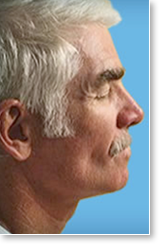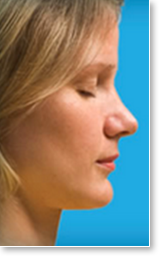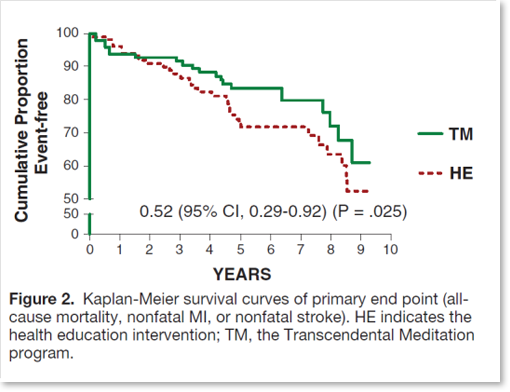I find that sometimes people wonder whether the various benefits that meditators say they experience after learning TM are due to the “placebo effect.”
Here’s an interesting response to that question from researcher Dr. David Orme-Johnson:
“Placebo effects are powerful, but they are psychological, short-lived, and decay over time. It is generally understood in the scientific community that a treatment effect is not due to placebo if it can be demonstrated by objective measures as having long-term effects.
In numerous studies the Transcendental Meditation technique has been found to produce long-term effects—ones that grow stronger the longer a person regularly practices the TM technique.
Like placebos, the TM technique can produce substantial short-term effects. This has been shown in a number of studies where TM has been found to substantially reduce anxiety in as soon as the first two weeks of practice.1 But some placebos do also. However, related research on the TM technique also shows distinctive physiological changes that naturally produce a basis for long-term growth, such as sustained reductions in anxiety.1-4
Here are some examples of the kinds of physiological changes that research has found:
1. The physiology of the transcending process through the TM technique is the opposite of the physiology of anxiety, indicated by reduced respiratory rate, muscle tension, reduced plasma cortisol, and increased autonomic stability,5-11 and increased coherence of brain functioning as indicated by increased EEG coherence.12-14
2. The reduced physiological correlates of anxiety are also sustained outside of meditation in day-to-day life, as seen in 50% less reactivity to stress in those who have been practicing TM for five months,15 in lower cortisol levels being sustained after meditation,16-18 and in increased EEG coherence during stressful tasks after meditation.19
3. Randomized controlled trials show that TM practice increases resilience–improved logical reasoning, reaction time, practical intelligence, and creativity–all important capabilities for effectively coping with threat and overcoming anxiety.4,12
4. Longitudinal studies have found that TM practice reduces anxiety-related behavioral problems, such as prison recidivism,20-22 cigarette smoking, alcohol and drug abuse,23 and reduced suspensions in schools.24
5. In several federally-funded studies by the National Institutes of Health, TM practice reduces anxiety-related diseases, such as high blood pressure,25-28 and other aspects of coronary heart disease,29 including heart attacks, strokes and death in a 10-year study.30
6. Finally, whereas placebo effects are short-term, TM practice produces long-term reductions in anxiety, as measured by psychological tests. 1-4 After all, feeling better and higher quality of life is the subjective significance of all the physiological benefits.
These illustrate how broadening our perspective to include a wide range of related objective measures and studying their long-term effects can help us to assess whether a treatment effect of a psychological outcome is anything other than a placebo.”
___________________________________________________________
David Orme-Johnson received his BA in psychology from Columbia University in 1963, and his MA, Ph.D. Psychology from the University of Maryland. Dr. Orme-Johnson is recognized as a leading expert in research on meditation. He was one of the first scientists to research the effects of meditation on the elimination of stress. His pioneering research in this area was first published in 1973 in the journal, Psychosomatic Medicine. To date Dr. Orme-Johnson has published over 100 papers on the psychological and sociological effects of meditation. Dr. Orme-Johnson has presented his research at over a hundred scientific conferences in 37 countries, including presentations to the United Nations on four occasions.
1. Sheppard WD, Staggers F, Johns L. The effects of a stress management program in a high security government agency. Anxiety, Stress and Coping. 1997;10(4):341-350.
2. Gaylord C, Orme-Johnson DW, Travis FT. The effects of the transcendental mediation technique and progressive muscle relaxation on EEG coherence, stress reactivity, and mental health in black adults. International Journal of Neuroscience. 1989;46(1-2):77-86.
3. Kondwani K, Schneider RH, Alexander CN, et al. Left ventricular mass regression with the Transcendental Meditation technique and a health education program in hypertensive African Americans. Journal of Social Behavior and Personality. 2005;17(1):181-200.
4. So KT, Orme-Johnson DW. Three randomized experiments on the holistic longitudinal effects of the Transcendental Meditation technique on cognition. Intelligence. 2001;29(5):419-440.
5. Wallace RK. Physiological effects of Transcendental Meditation. Science. 1970;167:1751–1754.
6. Wallace RK. The Physiology of Meditation. Scientific American. 1972;226:84-90.
7. Wallace RK, Benson H, Wilson AF. A wakeful hypometabolic physiologic state. American Journal of Physiology. 1971;221:795-799.
8. Dillbeck MC, Orme-Johnson DW. Physiological differences between Transcendental Meditation and rest. American Psychologist. 1987;42:879–881.
9. Farrow JT, Hebert JR. Breath suspension during the Transcendental Meditation technique. Psychosomatic Medicine. 1982;44(2):133-153.
10. Walton KG, Levitsky D. A neuroendocrine mechanism for the reduction of drug use and addictions by Transcendental Meditation. In: O’Connell DF, Alexander CN, eds. Self Recovery—Treating Addictions Using Transcendental Meditation and Maharishi Ayur-Veda. Binghamton, NY: Harrington Park Press; 1994:89-118.
11. Walton KG, Levitsky DK. Stress-induced neuroendocrine abnormalities in aggression and crime—apparent reversal by the Transcendental Meditation program. Journal of Offender Rehabilitation. 2003;36:67-87.
12. Travis FT, Arenander A. Cross-Sectional and Longitudinal Study of Effects of Transcendental Meditation Practice on Interhemispheric Frontal Asymmetry and Frontal Coherence. International Journal of Neuroscience. 2006;116(12):1519-1538.
13. Travis FT, Haaga DA, Hagelin J, et al. Effects of Transcendental Meditation practice on brain functioning and stress reactivity in college students. International Journal of Psychophysiology. Feb 2009;71(2):170-176.
14. Hebert JR, Lehmann D, Tan G, Travis FT, Arenander A. Enhanced EEG alpha time-domain phase synchrony during Transcendental Meditation: Implications for cortical integration theory. Signal Processing. 2005;85(11):2213-2232.
15. Orme-Johnson DW, Schneider RH, Son YD, Nidich S, Cho ZH. Neuroimaging of meditation’s effect on brain reactivity to pain. Neuroreport. 2006;17(12):1359-1363.
16. Jevning R, Wilson AF, Davidson JM. Adrenocortical activity during meditation. Hormnes and Behavior.1978;10(1):54-60.
17. Jevning R, Wilson AF, Smith WR. The Transcendental Meditation technique, adrenocortical activity, and implications for stress. Experientia. 1978;34:618-619.
18. Walton KG, Pugh N, Gelderloos P, Macrae P. Stress reduction and preventing hypertension: Preliminary support for a psychoneuroendocrine mechanism. Journal of Alternative and Complementary Medicine. 1995;1(3):263-283.
19. Travis FT, Haaga D, Hagelin JS, et al. Effects of Transcendental Meditation practice on brain functioning and stress reactivity in college students. International Journal of Psychophysiology. 2009;71(2):170-176.
20. Rainforth MV, Bleick C, Alexander CN, Cavanaugh KL. The Transcendental Meditation program and criminal recidivism in Folsom State Prisoners: A 15-year follow-up study. Journal of Offender Rehabilitation. 2003;36:181-204.
21. Alexander CN, Rainforth MV, Frank PR, Grant JD, Von Stade C, Walton KG. Walpole study of the Transcendental Meditation program in maximum security prisoners III: Reduced recidivism. Journal of Offender Rehabilitation. 2003;36(3):161-180.
22. Bleick CR, Abrams AI. The Transcendental Meditation program and criminal recidivism in California. Journal of Criminal Justice. 1987;15(3):211-230.
23. Alexander CN, Robinson P, Rainforth MV. Treating alcohol, nicotine and drug abuse through Transcendental Meditation: A review and statistical meta-analysis. Alcohol Treatment Quarterly. 1994;11:13-87.
24. Barnes VA, Bauza LB, Treiber FA. Impact of stress reduction on negative school behavior in adolescents. Health and Quality of Life Outcomes. 2003;1(1):10.
25. Alexander CN, Schneider RH, Staggers F, et al. A trial of stress reduction for hypertension in older African Americans (Part II): Sex and risk factor subgroup analysis. Hypertension. 1996;28(1):228-237.
26. Barnes VA. Impact of Meditation on Resting and Ambulatory Blood Pressure and Heart Rate in Youth. Psychosomatic Medicine. 2004;66(6):909-914.
27. Schneider RH, Alexander CN, Staggers F, et al. A randomized controlled trial of stress reduction in African Americans treated for hypertension for over one year. American Journal of Hypertension. Jan 2005;18(1):88-98.
28. Schneider RH, Staggers F, Alexander CN, et al. A randomized controlled trial of stress reduction for hypertension in older African Americans. Hypertension. 1995;26:820-827.
29. Barnes VA, Orme-Johnson DW. Prevention and treatment of cardiovascular disease in adolescents and adults through the Transcendental Meditation program®: A research review update. Current Hypertension Reviews. 2012;8(3):227-242.
30. Schneider RH, Grim CE, Rainforth MA, et al. Stress reduction in the secondary prevention of cardiovascular disease: Randomized controlled trial of Transcendental Meditation and health education in Blacks. Circulation: Cardiovascular Quality and Outcomes. 2012;2(5).








